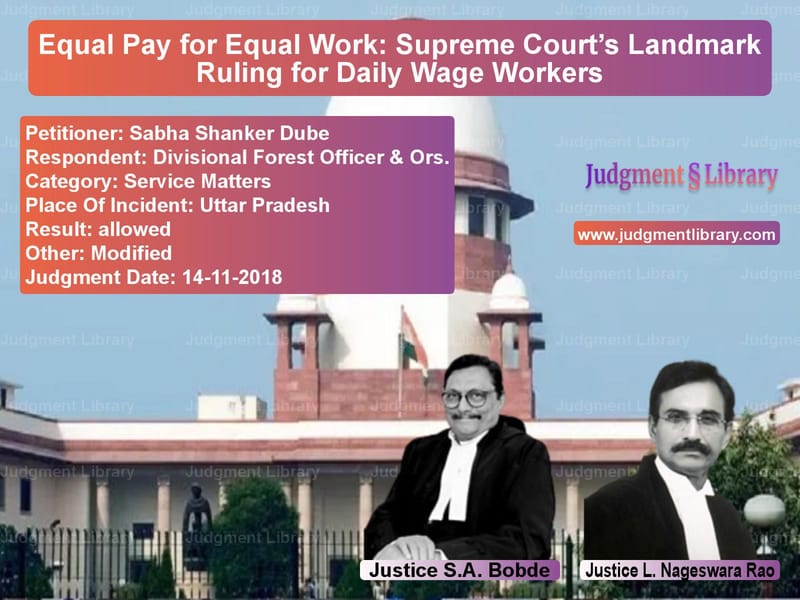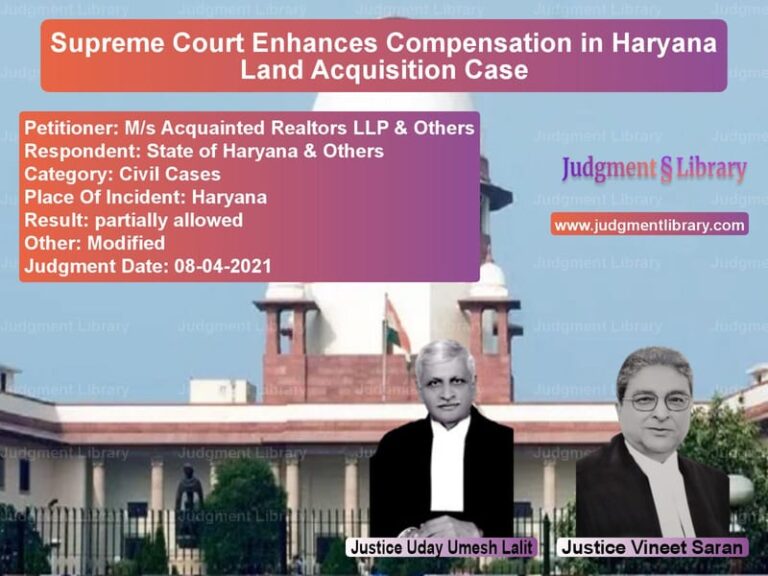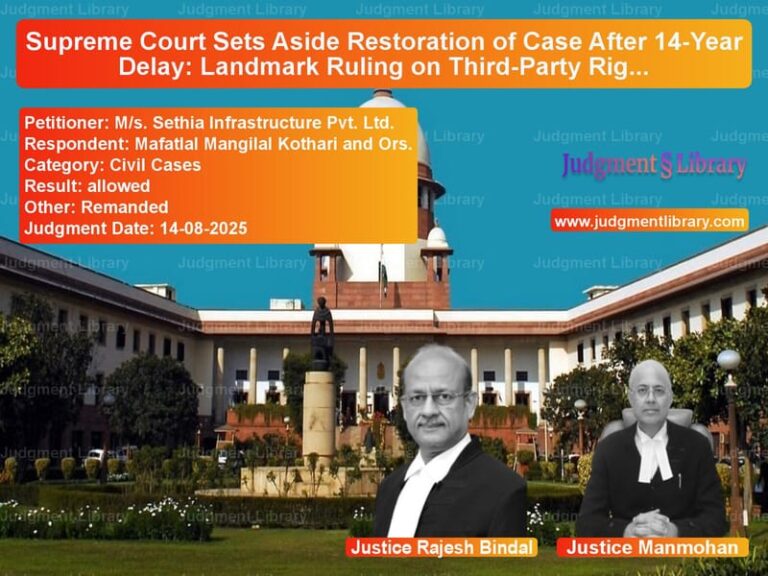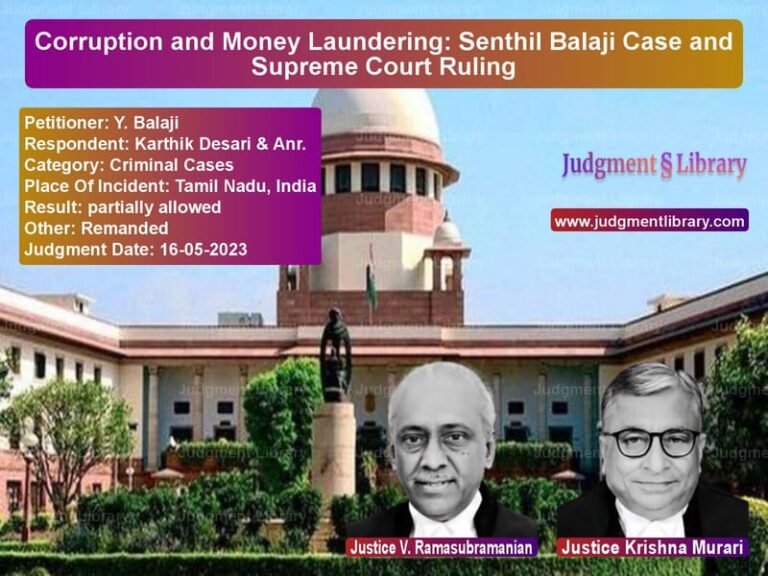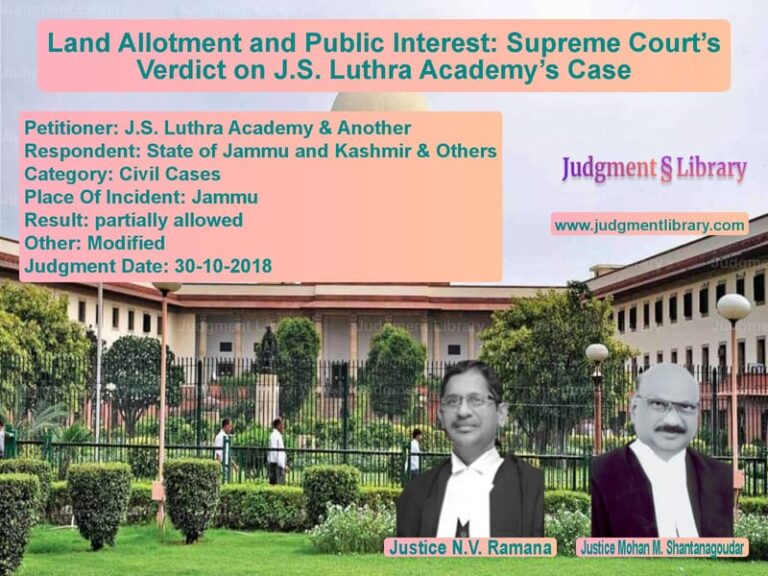Equal Pay for Equal Work: Supreme Court’s Landmark Ruling for Daily Wage Workers
The case of Sabha Shanker Dube vs. Divisional Forest Officer & Ors. dealt with a crucial issue concerning equal pay for equal work for daily wage employees in the Forest Department of Uttar Pradesh. The petitioners were employed as daily-rated workers in Group D positions and sought the minimum pay scale applicable to their regular counterparts. They claimed that they performed the same duties and responsibilities as regular employees and were thus entitled to equal wages.
The issue had been a subject of extensive litigation, with the petitioners initially approaching the Allahabad High Court for relief. The High Court dismissed their claims, prompting them to appeal to the Supreme Court. The Supreme Court, while ruling on this matter, provided clarity on the legal position concerning temporary workers and the applicability of the equal pay for equal work doctrine.
Background of the Case
The petitioners, who were engaged as daily wage laborers in the Forest Department, had worked for years in various capacities. They filed writ petitions before the Allahabad High Court, seeking:
- Regularization of their services.
- Minimum pay scales equivalent to regular employees.
- Condonation of gaps in their employment periods.
The High Court, in an order dated 28th April 2004, rejected their claims for minimum pay scales, stating that such relief could not be granted under Article 226 of the Constitution. However, it directed the state government to consider their regularization under the applicable rules. Dissatisfied with this decision, the petitioners filed an appeal before a division bench of the High Court, which also ruled against them.
Left with no other option, the petitioners approached the Supreme Court, challenging the High Court’s ruling and asserting their rights under the principle of equal pay for equal work.
Key Legal Issues
The case primarily revolved around the following legal questions:
- Were the daily wage workers entitled to the same pay scales as regular employees under the equal pay for equal work principle?
- Could the state government deny them minimum wages by citing financial constraints?
- What was the effect of previous Supreme Court judgments on similar matters?
Petitioners’ Arguments
The petitioners presented strong arguments in favor of their claims:
- They performed the same work as regular employees and should therefore be paid the same wages.
- The principle of equal pay for equal work had been upheld in multiple Supreme Court rulings, including State of U.P. vs. Putti Lal.
- They relied on State of Punjab vs. Jagjit Singh, where the Supreme Court ruled that temporary workers were entitled to minimum pay scales.
- The state government had initially complied with court orders and paid them Rs. 18,000 per month but later arbitrarily reduced it to Rs. 7,000 per month.
Respondents’ Arguments
The Uttar Pradesh government and the Forest Department opposed the petition on several grounds:
- The petitioners were engaged on a project basis and not against permanent sanctioned posts.
- There was no continuity of service, as their employment was subject to demand.
- Regularization was not an automatic right, and they could not claim parity with permanent employees.
- Granting them equal pay would place an undue financial burden on the state exchequer.
Supreme Court’s Observations
The Supreme Court, after hearing both sides, made the following crucial observations:
- The petitioners had been engaged in work identical to that of regular employees.
- The principle of equal pay for equal work applied and could not be arbitrarily denied.
- Temporary employees could not be exploited by paying them less for the same work.
- The state’s argument of financial constraints was not a valid justification for denying wages.
- The High Court had erred in rejecting the petitioners’ claims without properly considering Supreme Court precedents.
Supreme Court’s Verdict
The Supreme Court allowed the appeals and set aside the High Court’s ruling. The key directives issued were:
- The state must pay the petitioners the minimum pay scale applicable to regular Group D employees.
- These payments must be made effective from December 1, 2018.
- The court did not rule on regularization but allowed the government to decide.
- The petitioners shall be entitled to continued employment under existing conditions.
Impact of the Judgment
This judgment has far-reaching implications for daily wage workers across India. It reinforces the legal precedent that temporary workers cannot be paid less than their permanent counterparts if they perform the same duties.
Conclusion
The ruling in Sabha Shanker Dube vs. Divisional Forest Officer & Ors. is a landmark decision affirming the rights of daily wage workers. It establishes that workers cannot be exploited based on their employment status and that the principle of equal pay for equal work is not just a moral obligation but a constitutional mandate.
Petitioner Name: Sabha Shanker Dube.Respondent Name: Divisional Forest Officer & Ors..Judgment By: Justice S.A. Bobde, Justice L. Nageswara Rao.Place Of Incident: Uttar Pradesh.Judgment Date: 14-11-2018.
Don’t miss out on the full details! Download the complete judgment in PDF format below and gain valuable insights instantly!
Download Judgment: Sabha Shanker Dube vs Divisional Forest Of Supreme Court of India Judgment Dated 14-11-2018.pdf
Direct Downlaod Judgment: Direct downlaod this Judgment
See all petitions in Employment Disputes
See all petitions in Pension and Gratuity
See all petitions in Judgment by S. A. Bobde
See all petitions in Judgment by L. Nageswara Rao
See all petitions in allowed
See all petitions in Modified
See all petitions in supreme court of India judgments November 2018
See all petitions in 2018 judgments
See all posts in Service Matters Category
See all allowed petitions in Service Matters Category
See all Dismissed petitions in Service Matters Category
See all partially allowed petitions in Service Matters Category

